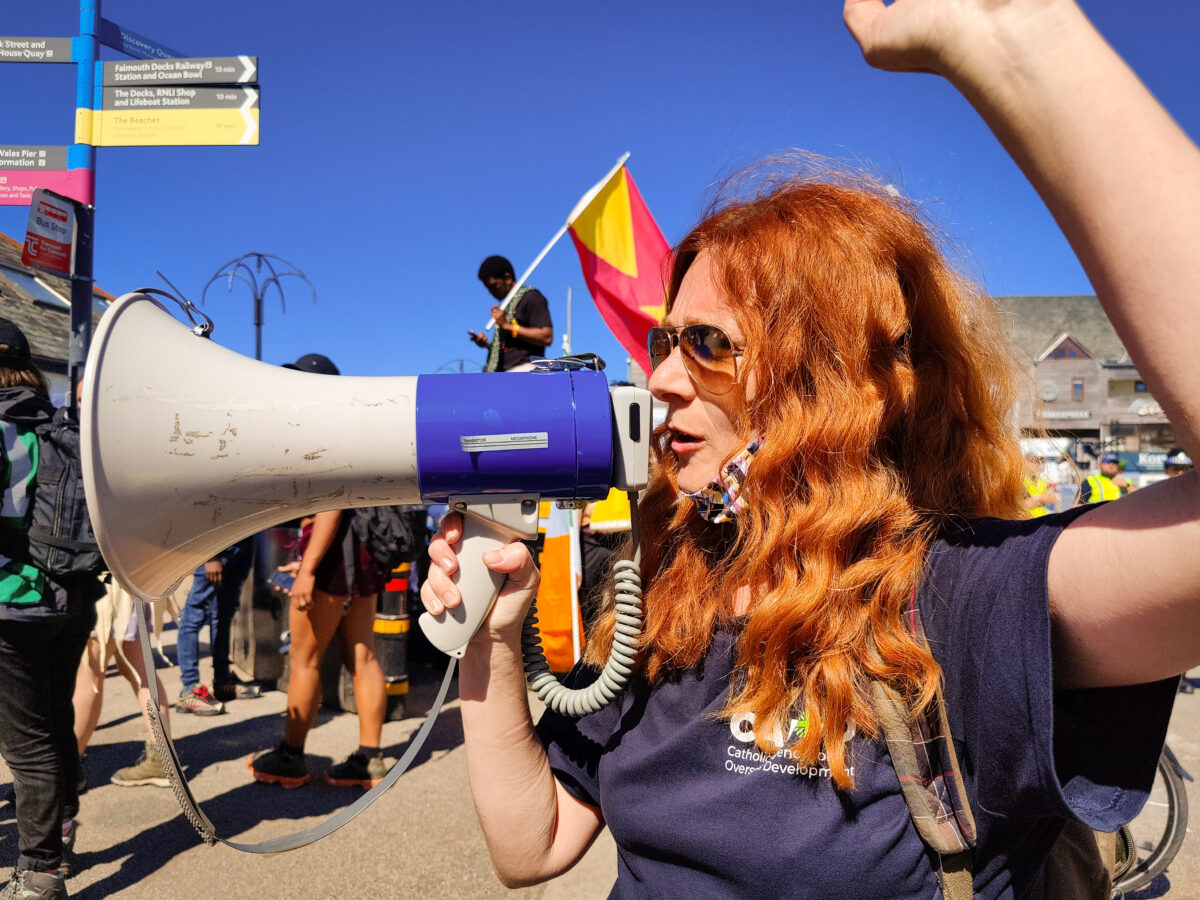Why am I fighting to fix the broken food system? In my native Argentina, the human cost has been too high

CAFOD has launched a campaign to fix the global food system. CAFOD’s campaign manager Andrea Speranza, who grew up during Argentina’s soya boom, explains how her experiences have motivated her to take part.
My memories of growing up in Argentina are filled with many a Sunday family gathering around the kitchen table spent chatting about the endlessly problematic economic situation in Argentina, and what it all meant for the future of us young members of the family. I can remember one Sunday particularly vividly, when my aunt said with hope and some pride, “We are among the top three global soya producers in the world now. That will change everything for Argentina.”
It did change everything. Unfortunately, those changes did not mean that the promises of poverty eradication and economic stability were realised. For years, Argentinians had been told that we would reap huge economic and development gains by shifting to producing a few export crops such as soya.
However, this model of food production came at a heavy cost, and it was indigenous communities, small farmers, and communities living close to the soya fields who paid the highest price of the soya boom in Argentina.
My aunt said, ‘This will change everything for Argentina.’ Unfortunately change came at a heavy cost
So, when CAFOD recently launched a campaign action calling on the World Bank to protect the rights of small-scale farmers to use their own traditional seed varieties – rather than continuing to push for polices that support big agribusinesses – I had mixed feelings.
On the one hand I couldn’t avoid feeling some frustration that, after several decades, we were still dealing with the same story: that profit-making for big business, rather than securing nutritional food in a sustainable way, still dominated the logic of the global food system. But I also felt some excitement because I know that when ordinary people get together, big changes can happen.
The power of campaigning
In the 1990s, as students in the Department of Philosophy at the university of Buenos Aires, my peers and I passionately debated the health, ecological and ethical implications of introducing genetically modified seeds.
Despite the concerns we had, a licence was given to the big agribusiness Monsanto to grow soya from genetically modified seeds.
As a consequence, the production of soybeans in Argentina expanded rapidly from 9,500 hectares in the early 1970s[1] to 16.2 million hectares in 2022[2].
Little babies were being born with six fingers, without a jawbone, missing a skull bone … and a lot of mothers and fathers were developing cancer
Sofía Gatica
Although these genetically modified seeds significantly increased yields, they required huge amounts of chemicals in order to achieve these results – something that came with dire consequences.
Chemical fertilisers and pesticides are both environmentally damaging and dangerous to human health. Research suggests that pesticides are responsible for as many as 385 million cases of poisoning and at least 11,000 deaths each year across the world.[3]
Sofía Gatica, one of the founders of Mothers of Ituzaingó, a group of women who raised awareness of an increase in children born with deformities, said that “little babies were being born with six fingers, without a jawbone, missing a skull bone … and a lot of mothers and fathers were developing cancer.”[4] She questioned the connection between these health issues and the planes flying overhead to spray crops with a herbicide called glyphosate, which was manufactured by Monsanto. The company (which was brought by Bayer in 2018) never acknowledged a relationship between the chemicals used in the fields and the illnesses reported in nearby communities.
Many scientists and health care providers have, however, since warned about the risks of glyphosate to human health,[5] with the International Federation of Gynaecologist and Obstetricians calling for a global phase-out[6] and countries including France outright banning its use.
More than two decades since the soya boom began in Argentina the fight continues against a food system which creates profit for a few large companies at the expense of people and planet. This battle is not unique to Argentina: farmers and rural communities across the world are struggling for control of the food system.
Challenging the imbalance of power
The CAFOD Fix the Food system campaign aims to challenge the power imbalance at the heart of the world’s food system, between large corporations on the one hand, and local communities on the other.
Our faith-filled actions are also like seeds, bearing fruits of change in our world
CAFOD is currently campaigning to ensure that the UK government uses its position in the World Bank to end loan conditions on low-income countries that reduce small farmers’ freedom to use their own varieties of seeds.
In other words, the World Bank has to stop creating conditions that leave small farmers with very few options other than having to purchase commercial seeds (and their accompanying chemical inputs) from big agribusinesses.
Expressions of solidarity from CAFOD supporters will play a vital role for those on the front line of the struggle to create alternative food systems that work for everyone.
Our faith-filled actions are also like seeds, bearing fruits of change in our world.
[1] https://grain.org/en/article/435-argentina-s-torrid-love-affair-with-the-soybean
[2] https://www.fastmarkets.com/insights/argentinas-2023-production-export-revenue-to-fall
[3] https://wedocs.unep.org/xmlui/bitstream/handle/20.500.11822/34463/JSUNEPPF.pdf?sequence=13
[4] Pesticide sickness – DW – 10/25/2013
[5] https://usrtk.org/pesticides/glyphosate-health-concerns/